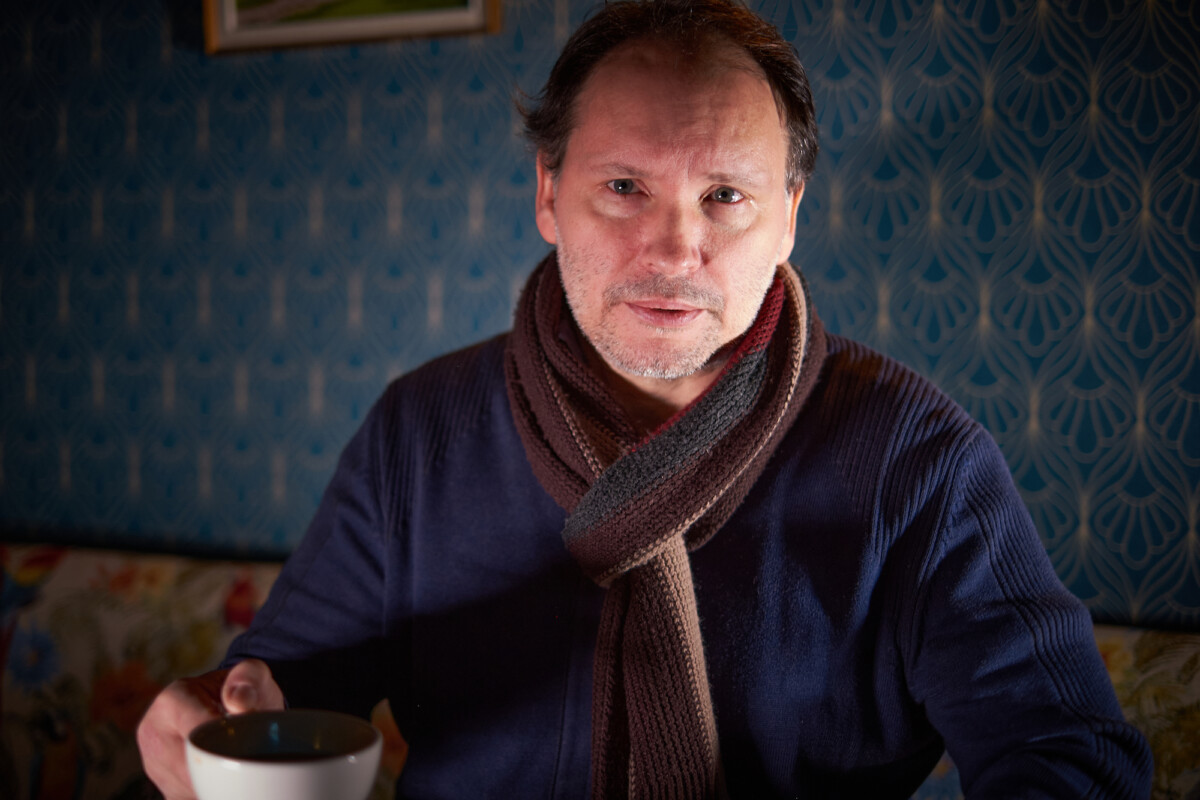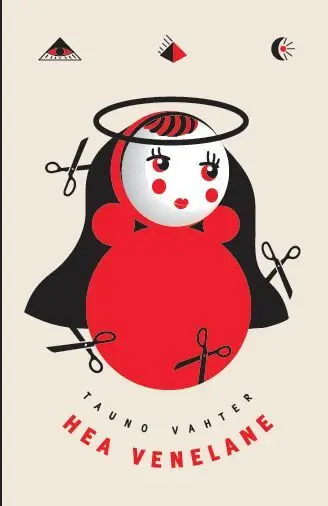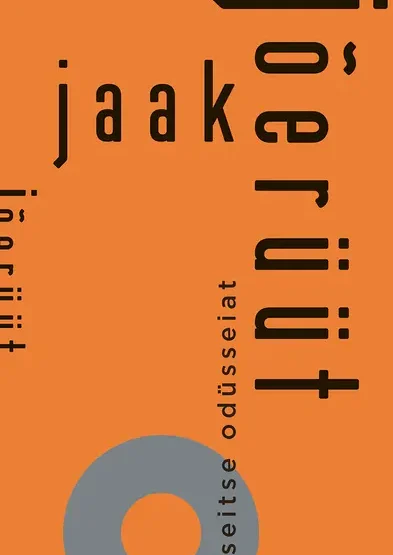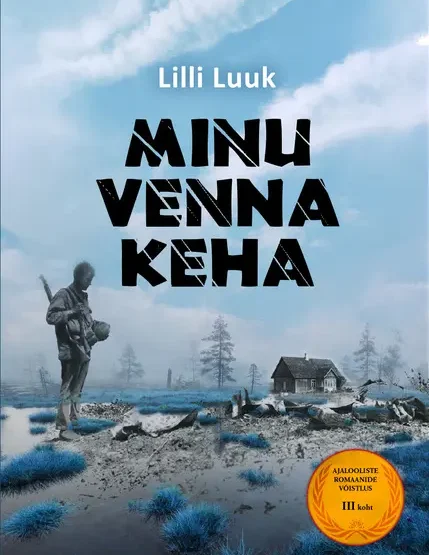Russian-Estonian writer Andrei Ivanov lives with his wife and son in a Soviet-era apartment block on the outskirts of Estonia’s capital. He grew up in Tallinn, studied literature at Tallinn University, immigrated to Scandinavia for an extended period, and returned in the early aughts.
Ivanov’s first novels and short stories were published a dozen years ago. Since then, he has become one of the most outstanding Russian-language authors in Estonia and has had his works translated into English, French, German, Finnish, and Estonian.
Andrei, you live in Estonia but write in Russian. Where are your readers?
To be honest, I do not think of readers a lot. It is much easier to imagine an editor as your perfect reader or a person that you respect very much. But even then, I’m afraid there is no use. It’s too stressful. I remember how I started off with Hanuman’s Travels. It was a cold Danish spring in 1998. I lived in a dirty refugee camp. I ate trash and wrote in English. I was lost, confused, plugged by all kinds of fear, I got drunk or high almost every day. My writing… it was a mess; it was totally de profundis! I could not imagine my readers, I did not think of anyone, I did not hope there would be any, it did not matter, the process itself mattered, it was like clutching the last straw. Now living in Tallinn, being published here and in Russia, I simply don’t care. What I care for is to be correct and exact, in regard to my writing, the images and the characters, the topic, idea, plot, everything – that’s what I care for. I know how to make it smooth and comfortable but, the point is, I believe the real stuff should be disturbing. And readers have to choose whether they want to be entertained or to be disturbed.
If I imagine my reader, then it’s definitely not the Russian reader, and on numerous occasions when I received my manuscripts back I have been told by Russian publishers that my books are definitely not for a Central Russia reader, whatever that means. And yet, to their surprise, I have found my circle of devoted readers in Russia. By no accident at all, one of my last book presentations happened in the Moscow Memorial office, so you may imagine who my readers mostly are in this country. Of course, I flatter myself that my books could be understood anywhere in the world, but one should be realistic, I can’t imagine my books in North Korea, for instance. The easiest of all, is to imagine my readers in Europe. Almost everything that happens in my books happens in Europe. Denmark, Estonia, France… It happens between the World wars, the Soviet or modern times, it is still Europe in general.
Your books are available in several languages. Do you think the nationality of your reader makes a difference in the way they receive your writing?
There must be. I was surprised to know that Scandinavia is more or less an exotic country for French readers. And in meeting with French readers I had to speak at length about stuff I would not normally dwell upon. Everywhere they asked me about the ‘alien’s passport’ and were curious to see it, which was a bit annoying and then became quite the reason to finally pass the exams and obtain my citizenship, however, I still believe that I was supposed to be given it at once without any examinations. Hanuman made a splash but, as it transpired, it made a splash in small circles everywhere. It was positively reviewed in France, with many reviews, more than a dozen, which is fantastic, but not a big number of readers. Next to none in the UK, which is a shame. A Handful of Dust was very well accepted by Estonian readers, but went unnoticed by Russian readers in Estonia and Russia.
How often do you get reactions in the first place, be they positive or negative?
I make more and more friends; it shows that my books steadily find their readers. I meet people, we talk and drink. Some of them are strange. There was one hitchhiker from Russia, he came from a small town in Central Russia, actually. He sounded weird on a phone, and since I’m very fond of the bizarre, I decided to meet him. He said he has a story exactly like mine. I was intrigued but when we met he said something that had nothing in similarity with my stories, except that he was in love with a Lithuanian woman. There was one young lady in Moscow who came mysteriously to my presentation, she was sitting with a big purse, which made me worry. I thought she had a Bull Dog revolver in her purse, but she had my book and asked for an autograph. The book was touchingly worn down.
What’s the role of a translator for you as a writer?
It is huge, of course. Especially in Estonia. I’m very grateful to all of them, and exceptionally grateful to Veronika Einberg who took the majority of my heavy stuff upon herself. Translating The Inhabitants of the Curious Cemetery is unthinkable because, now looking back, I consider it to be unthinkable to write such a book in the first place.
As I see it, your position as an author is that of an individualist observer who stands outside of all ideologies, societal transformations, and even certain literary circles. Why is this the case? Have you ever felt like exiting the role, if only temporarily? I.e., “joining”, “speaking your mind”, etc.?
As one wise man said: the cost of sanity is a certain level of alienation. I don’t know, it’s in my veins, I prefer solitude. I meditate a lot. I wish I could visit retreats, but the lack of funds and the situation of the virus made me seclude myself in my home office. I think my protagonist speaks out enough. Sometimes he says what I think, in a whisper. I take my reader on a private trip. In my last novel Theatre of Horror I let my characters speak their minds quite often, they give vent to rage and anger, strong feelings and indignation, their worldviews and political stuff, and it is quite obvious that the author supports them. I speak of intimate stuff too in my short novel Untermensch.
A dozen years have passed since your debut works were published – first in the Russian and Estonian languages in Estonia, and soon afterward by the giant Moscow publisher AST. Since then, you’ve released new novels in original Russian and Estonian translation almost every year. Looking back, which book – or overall achievement – mattered most?
It was important to write every book. It’s a kind of a ladder, I could not jump over one of them. I had to write Hanuman’s Travels and I had to have done it in this rough and earnest way. I could not start with any other one. I started it in 1998, that was a big deal, it helped me get through a difficult time. I could not shift to a third-person narrative, I had to write a long short story “Crisis”, about those days of the recession. After that story, I could move on and start The Harbin Moths, with my hands untied. I believe my best work so far is The Inhabitants of the Curious Cemetery, I realized that I’m old and tired, and writing this book I lost touch with people and I missed many things being away from home, this is how difficult it was, it could be a book written about how this book was written.
You said in an interview that you realized you had to keep on writing after reading The Blonde Beasts by the non-conformist, St. Petersburg-based author Marusya Klimova. What other writers have you learned from?
Yes, her novel shifted ground inside me, and I felt sort of undone. But I do not consider her a teacher, her novel gave me a boost, that’s all it was. The same happened when I read James Kelman’s How Late It Was, How Late, Knut Hamsun’s Hunger. Louis-Ferdinand Céline, Joyce, Nabokov, Sterne, Dickens, Rousseau. I reread three times. War and Peace. But I do not consider these authors my teachers. I feel comfortable in their company. If I get tired of one, I turn to the other. Kafka, for instance. For a few years, I reread Rousseau’s Confessions, it’s like reading the gospels for some people. Long repetitive reading provides me with a feeling of a long novel, a feeling that I am actually in the novel, although I may not be writing one. It’s hard for me being between novels, it’s like no man’s land, I feel very vulnerable. Therefore, I read some well-known, to me, authors, it’s soothing. It’s like going on a trip with a best friend.
In Untermensch, you write that you’re incapable of finishing the book; that the characters live on in your imagination. Could you expand upon that?
I would not finish novels at all. Tristram Shandy was not really finished. I received a Ph.D. thesis from a researcher at the University of Lyon who wrote on deaths in literature, my novels included. And it made me think: there are a lot of deaths in my novels! I think, on the other hand, my longing not to finish a novel, the desire to serialize it, giving the characters more than one life – it is a counterpoint to death maybe.
What is important to me is the relationship with the characters that are based on people I know. It is sometimes intimate to the point of uneasiness. It brings about confusion sometimes, people get angry with me, they cannot understand it is not them. There is always a line between the character and the real person. For instance, ‘my uncle’. The character is based on my uncle indeed, he has appeared in my writing for about 15 years. Not just because I want it, out of my whimsicality, which is also good reason enough. But he’s definitely a significant recurring character, a portrait. I made a portrait of an immigrant, who had known the Soviet time, used to hate USSR, then moved from Estonia to Denmark, lived in a Red Cross camp, tried to get employed, became disenchanted in capitalism, and now he says that Putin is right, the Soviet Union was great, and other stuff that makes me shudder. Of course, this transformation is important to contemplate and reflect upon. Especially now, when I bump into these kinds of Russian immigrants, Putin and Trump supporters, furious anti-vaccinators.
Two space times exist in your writing: the present day and the historical 20th century. What, for you, is the main difference in creating these dual worlds? You possess the real experience of living in one but have only read documents and memoirs about the other. Which is harder or easier?
I write a novel to question the boundaries of reality. Nothing is quite real, that’s what disturbs me. I do not want to take our reality as granted. It does not matter which novel it is. I look into myself, I always study myself, I am always a material that is close at hand. I have other people, I contemplate. People are people, it does not really matter when they live, at the core we are the same creations, we have the same desires and passions, same weaknesses and struggles, doubts, fears, et cetera. You can easily go wrong with details in a historical novel, but it is pardonable. I keep in mind the famous Shakespearean anachronisms. But my novels cannot be called historical novels in the common sense. I put ‘historical’ in commas, because I don’t believe in history being straightforward “truth”. It’s an interesting illusion, whether it’s a personal history or of a nation, it is still an illusion, something that we personally or collectively assume.
Rereading your earlier prose, I’m struck by the idea that I’m already face-to-face with history; that it’s a living document of the way people thought in the 21st century. Would you agree?
It is not a very distant past for us, but everything was different. It was the pre-smartphone time! We did not have iPads, nobody swiped yet! There were no Facebooked people taking the bus! How hilarious it was! I can’t say how much I documented during that time. I had a curious journal. I’d put down everything curious I came across into that journal. I was not only putting down the facts, I let myself write, attempting something, I sketched, spur of the moment, improvised, and mixed my personal impressions with the impressions of my unfledged imaginary characters, I wrote down the dialogues I heard in transport and the stories my wife told me, I wrote a lot of stuff, it was my laboratory where I experimented. The reality and my imaginary heroes, their life’s events and the facts of real life, newspaper clippings, poems, news – everything was melting there into one substance. The most curious and most poetical results of those experiments are A Night in Saint-Cloud’s and Untermensch.
When I translated your story “My Danish Uncle”into Estonian in 2010, the refugee crisis was just beginning to unfold in Europe. Your debut novel Hanuman’s Journey to Lolland, which explores the attitudes of people who left their homelands towards a bloated and self-centric Europe, was published at around the same time. What feelings do you have now when seeing what’s happening on the EU’s borders – i.e., Poland and Lithuania?
“May the gods save me from becoming a stateless refugee! This is the most pitiful of all pains, death is better.” Medea, Euripides. When I attended the Writers Reunion in Lahti (LIWRE) – I guess, it was in 2017 – I compared the refugee crisis with the famous painting The Raft of Medusa by Theodore Gericault, and I believe I said everything, my opinion has not changed since, it’s just become even more pessimistic.
Tell me a little about your latest novel, Theater of Horrors.
I wrote about people of my age, or a bit older, unemployed, and estranged, lost, divorced, embittered, despaired. They enter into all sorts of humiliation for money, they participate in a freak show. They wear the masks of a zombie; they move like zombies and the other people (customers) pay for the show and hunt them with paintball rifles. And some of the visitors step over the line and do some evil harm to the miserable in masks, but it does not stop most of my characters from going out into the fields in masks.
It’s a personal novel too. I reflect on what art is for me, does it really have to be entertainment? What is art, what is beauty? For instance, I find ugly things beautiful. I like abandoned places, ruined houses, old cars, I take pictures of cracks in the ceilings, old paint peeling off the walls – I see pure impressionism in some of those. I like the artists like Francis Bacon and Zdzisław Beksiński. I wrote a screenplay for Yevgeny Yufit, who was a necrorealism artist and filmmaker from Saint Petersburg.
Theater of Horrors is a chivalric romance of our time; although ‘chivalric’ in the spirit of Cervantes. We need heroes, we need artists, we need those who are out of the ordinary. One of my characters makes a theater of horrors in an old, abandoned factory, and he makes those horrible sculptures of the Soviet past, the bureaucrats, the military man, the miserable soviet people, the killed, the martyrs, the murders, etc., the grand exhibition, a sort of encyclopedia of Soviet horrors. We need to get those demons out, and he does, he exhibits them. And it has to be done. +
You turned 50 on Christmas Eve, 2021 – my heartfelt congratulations! For whom are you writing now, in these difficult and convoluted times?
It is always hard to write. It is not easier to write when everything is hunky-dory. I write for no particular audience, which makes it all simple. I have stuff on my mind, I live with it, I put it into my journal, the material accumulates, I think of it and decide whether or not it is worthy of being used in a novel or a story. I do not know who is going to read it.





